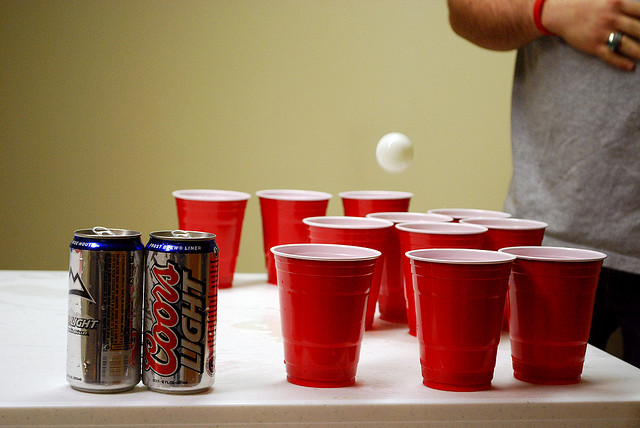
To combat drinking on campus, Boston University is publishing the weekly number of alcohol-related medical transports on its website (Laura Bittner/Flickr CC).
The Chronicle of Higher Education is reporting this week that 40 percent of college students drink intentionally to get drunk, to pre-game or to even black out. Now, one local university is taking a new approach to the old problem of binge drinking on campus.
Go to the official Boston University website and you see the typical campus highlights – the latest sports scores, campus activities and research breakthroughs. But click on the "Health and Wellness" banner and you see something you normally don’t: the number of students who are taken to local hospitals each week for serious alcohol issues.
The tally so far this semester? Ninety eight medical transports. That’s an average of nine a weekend.
Some BU students aren’t shocked by the numbers. They know that binge drinking – having four or five drinks within two hours – does happen on campus.
“What we’re trying to do is get information out,” says BU Police Chief Tom Robbins. “Educate, educate, educate.”
Robbins says the university, which enrolls more than 30,000 students, is publishing the numbers on its website because it wants to be more transparent, regardless of how that might affect its reputation.
“We’re not naïve,” Robbins says. “We know underage students drink. We know that, but that’s no excuse to not give them the information.”
Over the past five years, BU has seen a decrease in the number of transports. While Robbins would like to see binge drinking disappear completely from campus, he knows it never will and he says it wouldn't be so bad to see those hospital visits actually increase.
“If there’s more transports coming in, maybe the message is getting out that, ‘Look we know you’re going to drink but if this person is so intoxicated that they can’t really care for themselves, we want that call," says Robbins.
Most colleges collect data on student drinking, but it’s not widely shared.
“The reasons I think are obvious. They’re concerned about bad publicity,” says public health professor Bill DeJong, adding that underage and heavy drinking is a major problem on campus - something most colleges prefer to hide.
Every year, more than 1,800 students die of alcohol-related causes, according to the National Institute on Alcohol Abuse and Alcoholism. Still, DeJong doesn't think it necessarily dominates college culture the way pop culture makes us believe.
“I think students, especially freshmen, come in thinking that to attend college is to drink," DeJong says. "That is what our culture has taught them, so it is this misperception of what the drinking norms really are that's a contributing factor."
DeJong points out that most college students drink in a moderate, responsible way, and nationally 20 percent of students don't drink at all.
“It’s important for us to get that information in front of students so they can make a more informed choice about what they want to do,” says DeJong.
Still, it’s unclear how much any website can help the drinking culture on campus.
"I don't know if that actually has a direct effect on people's attitude come weekend time,” says BU junior Jo Maccune, waiting for the campus bus. “It's one thing to see the number and be like, 'Oh, well that's unfortunate.' You know? But then how does that actually translate to what you're doing?”
Junior Emily Lerhe agrees. “It's like seeing a number for car accidents or something, people are like ‘Wow, that sucks but it’s never going to happen to me,’” says Lerhe.
To convince more students that it could happen to them, BU isn't just banking on the numbers. It's now requiring online courses and campus programs.
Do you think binge drinking is a major problem on college campuses? Should all schools publish the number of medical transports? Share your thoughts in the comments section below or join the conversation on Twitter.










